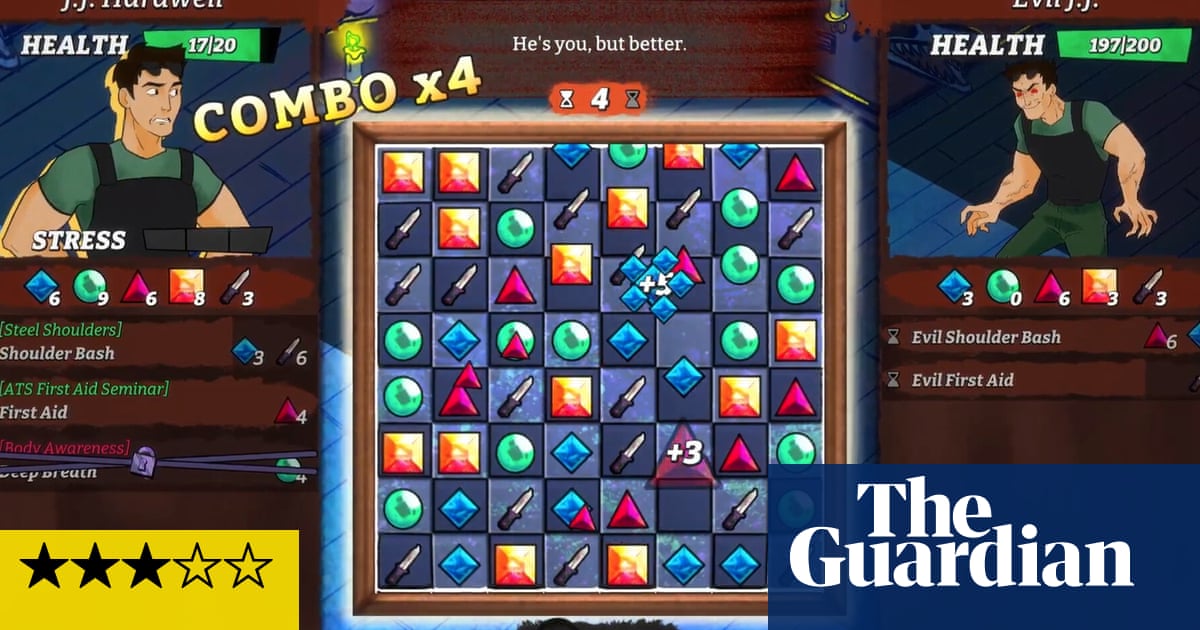Nearly every page in Sophie Kemp’s debut is smart, jarring and wickedly funny. Set in Brooklyn in 2019, this wild, absurdist take on the millennial novel tracks the adventures of Reality Kahn, a 23-year-old waterslide commercial actor and zine-maker who determines to become “the greatest girlfriend of all time”, after her drug-dealing sex partner, Emil, casually suggests that she gets herself a man. Prior to that point, Reality had just been living her life, no strings attached. “Would having a special guy around really make me happier? Was this the life purpose I was looking for?” A boyfriend, she decides, might “add colour to my life as well as provide intrigue”. And, New York City being “a place where nefarious individuals got ideas”, he could also protect her from “getting raped so much”.
Reality’s quest kicks off with a hunt for “intel”. Where do guys who make good boyfriends usually spend their time? Farcical as it is, her inquiry touches on that most sobering of cliches about true love: that it is darn hard to find. Emil responds with confusion: “Where do they hang out? Girl, I think you’re sexy as fuck and fun, but for serious, you are on some sort of insane-ass trip these days. They’re not a pack of wildebeests in the plains.” Desperate for better advice, Reality turns to Girlfriend Weekly, Kemp’s cheeky homage to the time-honoured world of women’s magazines. It has all the answers she’s looking for, even if they are hilariously fusty and over the top: “Bring a little charm with you everywhere that you go. For example, when you are at the grocer’s, be sure to give a smile and a wink to the dashing gentleman in the porkpie hat. Say: ‘Gee whiz, woo-woo, you are a beautiful specimen and I am a virgin.’”
Reality goes to the mall; the men there are all short on boyfriend potential. She finally finds it in 26-year-old crack-smoking Ariel, who helps her out of a locked bathroom at a music event (because really, who can resist a lavatorial knight errant?). A doctoral candidate in Assyrian history at NYU who’s also in a boyband, “sad-eyed” Ariel is your quintessential fuckboy: flaky, tactless and commitment-shy, but always up for some kinky fun.
Alas, he is what Reality wants, and she works to win his heart and make their connection official. Her modus operandi? You guessed it: extreme devotion and sexual surrender. “I’m trying to become a vessel for him,” Reality says, reclaiming the biblical metaphor.
Betraying a naive optimism about the rewards of giving herself over, Reality’s posture more worryingly smacks of what Kemp has, in an essay on Trump-era masculinity, described as “a brand new way to be anti-establishment: to be kind of trad”. Men crave hierarchy, she writes, but so can women. The idea of male control, however dangerous, can be very seductive to those who feel “exhausted by a certain kind of politics around consent”. Women, Kemp contends, reinforce men’s toxic belief in their entitlement through “the kind of sex they are having, in asking for things that they shouldn’t ask for”.
While Ariel is more of a regular jerk than an Andrew Tate, Reality appears more than willing to let him dictate their lovemaking, even as this gradually complicates her ability to freely consent. The sex scenes are as droll as they are provocative, precisely because, along with power, patriarchy and masculinity, they confront the contradictions of female desire.
Kemp’s language is profane and outrageously camp, blending punk-infused chutzpah, feminist irony, meme-worthy disclosures and mic drops with sick, unsettling humour. At one point, Reality’s acquiescence is delivered in the “terrible whorish voice of a sexualised child”. Ariel wants anal, and suddenly Reality’s on an ecstatic cosmic ride: “I was on a surfboard. I was wearing a blue dress. I was wearing a motorcycle helmet. It was lap after lap, veering past huge chunks of space debris. It was beautiful. It really was.”
The further we venture into the story, the kookier and more absurd it gets. Reality signs up for a drug trial that promises to transform her into the perfect girlfriend (or an “ethereal bimbo with no interiority”, as Emil sees it). By the novel’s close, she finds herself in a surreal place called Mount Nothing, where she meets a crew of other girlfriends (all bizarrely bald), and a talking, shades-wearing garden snake named Ungaro Ulaanbaatar.
Too much? Well, for what it’s worth, not everything in this book is meant to make perfect sense (“Exisssstence is meaninglessssssss and random. YOLO,” Ungaro Ulaanbaatar says to Reality). Indeed, if there’s anything that Kemp seems to ask of the reader, it is to loosen up and have fun. I did, and I adored this novel: it’s a clever and wholly original skewering of the modern dating landscape, our obsession with true love, and the outlandish lengths we’ll go to in its pursuit.

.png) 4 hours ago
6
4 hours ago
6













































